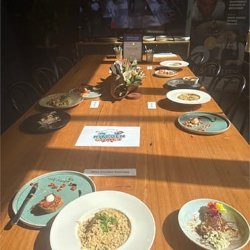Portugal is a Catholic country, so November 1, Dia de Todos-os-Santos, is a holiday. Churches hold mass and some families visit cemeteries to place flowers in front of the tombs.
Speaking of gravesites, most are big enough that a casket can be interred in front of the cross, but there are rows of stately mausoleums at the Prazeres Cemetary in Lisbon. They look like little stone houses, and each of them can hold the caskets of an entire family.
Some of them, as you can see in the picture, bury the person underneath a stone statue. They make you wonder just how much the person was revered by their family, or how influential they were. Because the mausoleums are so large at Prazeres, they have a map at the entrance explaining the different types (by design, occupation, who is buried there, and so on). They’re grouped into different zones, sometimes with indicators placed in front of each tomb.

Rows of stately mausoleums


Map of tombs with stone statues. No. 3 is a Freemason.
Back to the All Saint’s Day holiday. In the region where I live, the kids head out in the morning with bags for bread and go around to the houses in the neighborhood calling out “Pão por Deus” (“Bread for God”) in exchange for treats. People historically gave them broas, a kind of bread made from sweet potatoes, but you don’t see it much these days as it’s time-consuming to make and other treats can be bought easily.
I wrote about this a while back, but we’re fortunate that in the area where we live, there are still older people who bake Pão por Deus for All Saints’ Day. My son has even brought some home with him when he’s gone around the neighborhood asking for treats.
This year, I bought a bunch of Pão por Deus from a woman nearby and gave it to my foreign friends. I also got some treats for the kids. It’s a busy day as you hear them out there shrieking from the morning hours.

Traditional Pão por Deus

Treats for the kids
Someone I know told me that there’s no such tradition in Lisbon, since it’s too dangerous. Instead, on Halloween (October 31, a day also familiar to people in Japan), kids go out with their parents and knock on doors in their apartment buildings to get treats.
I was also surprised to find out that at another area near Lisbon, the kids get October 31 off from school instead of the traditional holiday on November 1.
It’s a little sad to see unique national and regional traditions disappearing as the world becomes more globalized.
Still, All Saints’ Day and Halloween, with all the treats you get, are apparently among my son’s favorite holidays. I worked hard to make them American-style jack-o'-lanterns and even surprised them with a Halloween-inspired dinner! I guess it’s pretty easy to get swept up in the trends after all.

Halloween dinner




















































